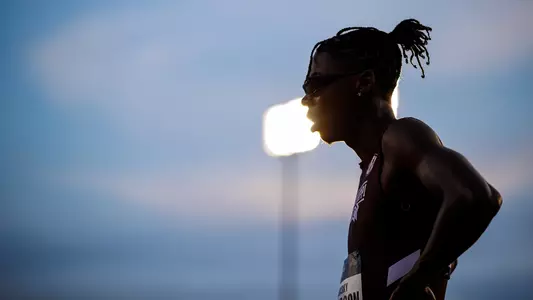
Going The Distance
July 22, 2024 | Track & Field, Olympic Games
How Navasky Anderson sidestepped his nation’s sprinting identity and raced to the world stage
When Navasky Anderson steps on the track in Paris, he will become just the 11th Jamaican man to race in the 800m at the Olympic Games.
While there is possibly no nation more track-crazed than the Caribbean island, Jamaica is known much more for its sprints than the middle-distance events, making Anderson's appearance a bit of a rarity. In fact, he'll be the first Jamaican man to race in his event at the Games in 16 years.
The last Jamaican 800m runner at the Olympics was Aldwyn Sappleton in Beijing in 2008. He finished sixth in his first-round heat and 41st overall. Anderson remembers watching those Olympics as a child, but like so many others in his home nation and around the world, his eyes were on a different athlete in the green and gold.
"I can say at first, at a very young age, it was more of I wanted to be like Usain Bolt," Anderson said. "I wanted to be like Usain Bolt. I wanted to get so much into sprinting."
Bolt would win a pair of gold medals at those games, clocking world records in both the 100m and 200m.
Jamaica has won 87 medals in track and field at the Olympic Games. Eighty of those medals have come in distances of 400m or less, including 17 in relays. Even further highlighting their dedication to sprinting, the island nation has won 44 medals in the men's and women's 100m and 200m alone.
Even with the addition of Jamaica's lone medal from all other sports, that means that the short sprints have accounted for 50 percent of the nation's summer Olympic medals.
But it wasn't always this way. In fact, Jamaica's first Olympic medal of any kind came in the 800m. Arthur Wint won a silver medal in 1948 in Jamaica's first Olympic Games in London. He would add a gold in the 400m as well. Four years later in Helsinki, he became the fifth man in world history to win multiple 800m medals as he repeated his silver medal performance.
In 1960, despite competing on the British West Indies Federation team alongside athletes from Barbados and Trinidad, George E. Kerr won a bronze medal in the two-lap distance. Though it did not officially count towards Jamaica's total, that race would have given Kerr's home country three medals in the men's 800m in its first four Olympic competitions.
Kerr again finished fourth, this time while wearing "Jamaica" on his chest in 1964. No Jamaican man has advanced past the semifinals since.
Despite this early success in the event, Anderson modeled his track career less off his countrymen and more off a rising star from Kenya.
"By the age of 12, watching the 2012 Olympics I saw Usain Bolt, you know, shattering records from 2008. But then [Kenya's] David Rudisha, was able to shatter 800m records, and I was like, maybe I could also be like this guy too," he said. "My first post ever on the internet was post of Usain Bolt and David Rudisha, because I didn't know who I wanted to become."
Rudisha had burst onto the world stage in 2009, reaching the semifinals at the World Athletics Championships before breaking a 25-year-old African record in the event later that year. By 2010, he had broken the world record twice, won his first Diamond League Trophy and became the youngest athlete to ever win World Athlete of the Year. In 2011, he was a world champion, and by 2012 he was winning a gold medal in his Olympic debut. He would defend that medal four years later in Rio.
So with Rudisha on his mind, Anderson's focus shifted away from the sprints and into the longer distances.
"I started out as a sprinter, but I just had the ability to run back-to-back miles," he remembered. "I could run five miles each day home from school, so I had that strength in me. Whenever I started doing cross country races and stuff, I'd usually just win everything. I guess I just strived to become somewhere in the middle. I just started running 1500m, 800m, 400m, and I realized that 800m is what I wanted to do."
Everything began trending upward from there. After a two-year stint at Essex Community College that culminated in a runner-up finish at the 2020 NJCAA Indoor Championships, Anderson signed to continue his career at Mississippi State. In his first season in Starkville, he shaved three seconds off his personal best, an eternity in 800m terms. That put him in striking distance of some rare company.
"Starkville, Mississippi, stood out to me, because I didn't just want any coach to maintain my performance or how I was running," Anderson said. "I actually wanted to be developed… I was just getting so much better, and everybody was wondering what I was doing down in Mississippi. It was just training really hard and staying really focused."
By the end of the next season, Anderson had dropped four more seconds off his PR. At the 2022 NCAA Outdoor Championships, he shattered the 45-year-old Jamaican 800m record, clocking in at 1:45.02 to finish as the national runner-up. Anderson was then called up to run for Jamaica at the World Championships that year, reaching the semifinals. He was the first man from Jamaica to run in a world-level 800m semifinal since Marvin Watts had reached the 2000 Olympic semifinal by protest when another runner was disqualified. Later that year, he reached his first career senior final at the Commonwealth Games where he placed fifth.
In 2023, he won his first international medal, taking bronze at the Pan American Games with "Jamaica" across his chest.
While there is possibly no nation more track-crazed than the Caribbean island, Jamaica is known much more for its sprints than the middle-distance events, making Anderson's appearance a bit of a rarity. In fact, he'll be the first Jamaican man to race in his event at the Games in 16 years.
The last Jamaican 800m runner at the Olympics was Aldwyn Sappleton in Beijing in 2008. He finished sixth in his first-round heat and 41st overall. Anderson remembers watching those Olympics as a child, but like so many others in his home nation and around the world, his eyes were on a different athlete in the green and gold.
"I can say at first, at a very young age, it was more of I wanted to be like Usain Bolt," Anderson said. "I wanted to be like Usain Bolt. I wanted to get so much into sprinting."
Bolt would win a pair of gold medals at those games, clocking world records in both the 100m and 200m.
Jamaica has won 87 medals in track and field at the Olympic Games. Eighty of those medals have come in distances of 400m or less, including 17 in relays. Even further highlighting their dedication to sprinting, the island nation has won 44 medals in the men's and women's 100m and 200m alone.
Even with the addition of Jamaica's lone medal from all other sports, that means that the short sprints have accounted for 50 percent of the nation's summer Olympic medals.
But it wasn't always this way. In fact, Jamaica's first Olympic medal of any kind came in the 800m. Arthur Wint won a silver medal in 1948 in Jamaica's first Olympic Games in London. He would add a gold in the 400m as well. Four years later in Helsinki, he became the fifth man in world history to win multiple 800m medals as he repeated his silver medal performance.
In 1960, despite competing on the British West Indies Federation team alongside athletes from Barbados and Trinidad, George E. Kerr won a bronze medal in the two-lap distance. Though it did not officially count towards Jamaica's total, that race would have given Kerr's home country three medals in the men's 800m in its first four Olympic competitions.
Kerr again finished fourth, this time while wearing "Jamaica" on his chest in 1964. No Jamaican man has advanced past the semifinals since.
Despite this early success in the event, Anderson modeled his track career less off his countrymen and more off a rising star from Kenya.
"By the age of 12, watching the 2012 Olympics I saw Usain Bolt, you know, shattering records from 2008. But then [Kenya's] David Rudisha, was able to shatter 800m records, and I was like, maybe I could also be like this guy too," he said. "My first post ever on the internet was post of Usain Bolt and David Rudisha, because I didn't know who I wanted to become."
Rudisha had burst onto the world stage in 2009, reaching the semifinals at the World Athletics Championships before breaking a 25-year-old African record in the event later that year. By 2010, he had broken the world record twice, won his first Diamond League Trophy and became the youngest athlete to ever win World Athlete of the Year. In 2011, he was a world champion, and by 2012 he was winning a gold medal in his Olympic debut. He would defend that medal four years later in Rio.
So with Rudisha on his mind, Anderson's focus shifted away from the sprints and into the longer distances.
"I started out as a sprinter, but I just had the ability to run back-to-back miles," he remembered. "I could run five miles each day home from school, so I had that strength in me. Whenever I started doing cross country races and stuff, I'd usually just win everything. I guess I just strived to become somewhere in the middle. I just started running 1500m, 800m, 400m, and I realized that 800m is what I wanted to do."
Everything began trending upward from there. After a two-year stint at Essex Community College that culminated in a runner-up finish at the 2020 NJCAA Indoor Championships, Anderson signed to continue his career at Mississippi State. In his first season in Starkville, he shaved three seconds off his personal best, an eternity in 800m terms. That put him in striking distance of some rare company.
"Starkville, Mississippi, stood out to me, because I didn't just want any coach to maintain my performance or how I was running," Anderson said. "I actually wanted to be developed… I was just getting so much better, and everybody was wondering what I was doing down in Mississippi. It was just training really hard and staying really focused."
By the end of the next season, Anderson had dropped four more seconds off his PR. At the 2022 NCAA Outdoor Championships, he shattered the 45-year-old Jamaican 800m record, clocking in at 1:45.02 to finish as the national runner-up. Anderson was then called up to run for Jamaica at the World Championships that year, reaching the semifinals. He was the first man from Jamaica to run in a world-level 800m semifinal since Marvin Watts had reached the 2000 Olympic semifinal by protest when another runner was disqualified. Later that year, he reached his first career senior final at the Commonwealth Games where he placed fifth.
In 2023, he won his first international medal, taking bronze at the Pan American Games with "Jamaica" across his chest.
Players Mentioned
OLYMPIC GAMES | Navasky Anderson's Olympic Journey
Monday, July 29
OLYMPIC GAMES | Marco Arop's Olympic Journey
Thursday, July 25
OLYMPIC GAMES | Anderson Peters' Olympic Journey
Monday, July 22
OLYMPIC GAMES | Ilana Izquierdo's Olympic Journey
Sunday, July 21





